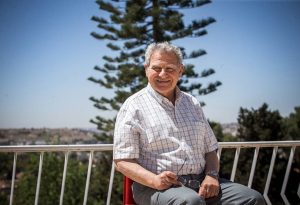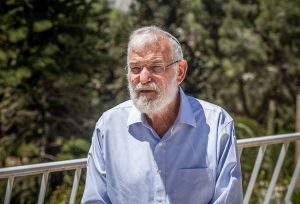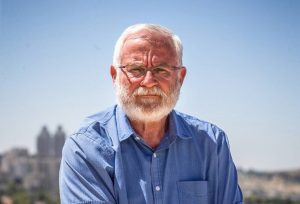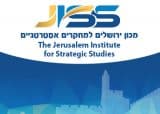Defense and Security experts from the Jerusalem Institute for Strategy and Security sit down with Israel Hayom and outline their new national security plan for Israel. They explain that while Hamas isn’t worth a ground offensive, Israel must contain Hezbollah. And Iran? Iran is the biggest threat.
Israel Hayom, 26.05.2019

Only a few hours had passed since the article went online, and former Defense Minister Avigdor Lieberman was on the phone. He called the author, Maj. Gen. (res.) Yaakov Amidror, and asked for an English version of the new piece, which explained Iran’s dangerous activity in Syria.
“I want to send the article the defense ministers internationally,” Lieberman said.
A few weeks later, when the English translation was ready, the article was sent to dozens of defense ministers across the globe.
Amidror, a former chief of staff for the National Security Council and the former head of the Research Division at the Israel Defense Forces’ Military Intelligence Directorate, wrote the paper “The Logic of Israel’s Actions to Contain Iran in Syria and Lebanon” as the Anne and Greg Rosshandler Senior Fellow at the Jerusalem Institute for Strategy and Security. JISS was established a year and a half ago with the goal of moving the defense and security discourse to the right. While its researchers prefer the term “conservative,” the differences between them and the hundreds of senior military commanders who prior to the election signed a public call for Israel to made territorial concessions, are very clear.
“In the current circumstances, unilateral Israeli withdrawals won’t increase Israel’s security or improve its international standing. The precedents of unilateral Israeli withdrawals in Lebanon and the Gaza Strip ensured that the conflict would continue, and even escalate. Similarly, unilateral withdrawals from Judea and Samaria could give Hamas control of those areas. Unilateral withdrawals will only whet the Palestinians’ appetite for more concessions, and will increase tensions in Israeli society,” JISS research fellows wrote in a recent document outlining a recommended diplomatic framework for the new Israeli government.

Prof. Efraim Inbar: Israel must maintain control of the entire Jerusalem envelope and build in E1. Photo: Oren Ben Chakon, Israel Hayom.
The JISS’ close ties to Prime Minister Benjamin Netanyahu, his ministers, and the current decision-makers might be its strongest card. Amidror formerly served as national security advisor to the prime minister and is still in contact with him. The same goes for Col. (res.) Dr. Eran Lerman, who served as deputy head of the National Security Council and whose worldview is similar to Netanyahu’s. Diplomatic-security circles are aware of these ties, so ministers and diplomats who want to enrich their knowledge or understand what the prime minister is thinking often look at briefings by JISS researchers.
Using force via consensus
Recently, and not by coincidence, a former deputy IDF chief of staff joined the institute – Maj. Gen. Yair Golan. Despite his speech about “identifying processes” in Israeli society, Golan thinks that Israel must show more “muscle” in its regional tactics. Golan was abroad and could not participate in this interview, but his fingerprints are obvious in the military section of the national security recommendations we gathered to discuss, a document which could soon find itself on the prime minister’s desk.
The institute’s fellows, led by President Efraim Inbar and his deputy David M. Weinberg, will lay out 14 main recommendations for the diplomatic echelon. Surprisingly, some of them are a bit different from the policy Netanyahu has led thus far. The first recommendation, which the researchers see as most important, is to make “national cohesion” a top priority for the next government.
Q: Why, of all current diplomatic and security issues, did you choose to focus on that?
“We say that the people must not be torn apart, in either direction, not to the Right or the Left,” Lerman says. “This paper was written long before the current crisis in the Persian Gulf, because we see the Iranian issue as something that the new government will have to confront not long from now. We expect that people will pick their heads up and see the vulture circling. That obligates the nation’s leadership and all the responsible parties to look Iran squarely in the eyes, first of all.”
“But to handle that challenge properly, the most important thing we must do is preserve cohesion. We have just had the least pleasant election in many years. Given the dark clouds on the horizon, people need to be holding political discourse that is less critical and extremist. The discourse doesn’t match the challenge. We need to reach a state of national cohesion like there was before the [1967] Six-Day War.”
JISS President Professor Efraim Inbar adds, “The defense and security reality that Israel is facing sometimes requires the use of force. In our opinion, there should be national agreement about the use of force.”

Miki Aharonson: Maintain coordination with Russia. Photo: Oren Ben Chakon, Israel Hayom.
Q: In recent years, people have stopped talking about the option of military action against Iran’s nuclear facilities and it appears that idea has disappeared. You are suggesting it be brought back. Why?
Amidror: “Iran aspires to be a nuclear power. They aren’t afraid to take a risk as they did two weeks ago (vandalizing vessels in the Persian Gulf). The U.S. threatened Iran, and Iran still acted. That says that something big is motivating them … Why are they doing that? What is motivating them to act that way? They insist on building an independent Iranian war machine there, with militias, missiles, armed drones, and even invasions via Jordan, because it’s all part of one big plan.
“The plan is to create a threat to Israel that is so big that when the day comes and the person making the decisions in Israel will want to take military action against its nuclear program, they will be worried about the collective threat in Lebanon, Syria, and the Islamic Jihad in Gaza. That is North Korea’s doctrine. South Korea is the strongest opponent of military action to its north. Why? Because North Korea might be hurt, but Seoul would be demolished. The same thing [here] – the Iranians are building up these capabilities throughout the region so we’ll lose our flexibility of action. We need to do everything to prevent that, even at the risk of war. You need to understand the scope of the threat from the north and be ready to pay [the price].”
Q: Even in the form of a pre-emptive strike on nuclear facilities?
Amidror: “That also needs to be placed before the decision makers.”
Inbar: “Yes, bring it back to the table. A credible military option also helps the people who are currently trying to oversee negotiations to secure better terms from Iran than the [2015] nuclear deal. Both the Israeli public and the world at large need to know that Israel is serious and that such a step could lead to casualties for us.”
Lerman: “We need to be ready to take action. The world has gotten a few years of calm, but now the Iranian threat is back in a big way. The war in Syria is coming to an end and Hezbollah is available for a conflict with Israel. We are shoulder to shoulder with Saudi Arabia and the Emirates when it comes to Iran, but the U.S. change in policy is forcing the Iranians to make decisions. So the risk of war is greater.”

General Yaakov Amidror: Iran seeks to be the biggest threat to Israel. Photo: Oren Ben Chakon, Israel Hayom.
Micky Aharonson, an expert in international relations, says: “Given the rise in tension with Iran, it’s also important to maintain dialogue with the leadership in Moscow and lines of contact with Russia’s forces in Syria, which enables the prevention of clashes. As far as possible, we should avoid taking positions in international forums that could be interpreted as opposing Russian interests.”
Q: If that’s the case, why restrict ourselves to limited strikes in Syria? Hezbollah’s missiles won’t rust away, so why not start attacking their stockpiles, preventing Iran from using a pincer approach?
Amidror: “From a military perspective, a pre-emptive strike is very tempting. But the world doesn’t like wars like these, and it’s very difficult to secure national unity for a war we initiate. So a pre-emptive strike is tempting, but complicated when you look at the wider picture, internal and external.”
Q: So not a full-scale war. We could start bit by bit, and move the red line a bit each time.
Amidror: “In the situation that’s been created our activity in Lebanon will lead to war. We can’t nibble away at the status quo.”
Hamas isn’t worth a military operation
The document discusses in-depth the erosion of Israeli deterrence. It warns, for example, that “Insufficient performance over time testify to a fundamental flaw in the approach to the use of force;” that “there is no choice but to go back and use the old rules of war … only a determined ground offensive can break the spirit of the enemy;” and that “at the start of the Palestinian terrorism spree (2000-2001) the Israeli government didn’t want to maneuver within Palestinian cities, and in the IDF there was a common view that there was no point in a widescale occupation of territory. It took hundreds of dead and a year and a half of tough fighting to send the IDF into Judea and Samaria. Then it turned out that the IDF could secure major achievements through [ground] maneuvers.”
Q: Why not implement that approach in Gaza and launch a ground offensive that won’t topple Hamas, but will neutralize its attack capabilities?
Lerman: “Deterrence aims at consciousness, and it’s a slippery thing, but the way that the IDF is starting to be seen as an army that doesn’t want to fight on the ground is a perception that has to be broken. Still, if there is a need to use force – it’s in Lebanon. The danger in an operation in Gaza is that if we break Hamas, we’ll be left in charge of governing the Gaza Strip. On the other hand, after we hit Hezbollah, the country of Lebanon will remain, with a government.”
Amidror: “We won’t solve the problem of deterrence in Gaza, because if we strike Hamas, Hezbollah will say, ‘That was Hamas, they’re small.’ But the price of a ground operation isn’t worth paying for the sake of Hamas. Hezbollah, on the other hand, is an extension of Iran in the region, and they need to be ousted. Hamas is a tactical problem. In all the operations against it, Israel continued to develop its capabilities.”
Q: So the way you see it, we keep doing what we’re doing in Gaza, and every so often some crazy guy in Jabaliya wakes up and decides to bring down a home in central Israel?
Inbar: “There is no need to refrain completely from ground operations in Gaza, but not as a first option.”
Amidror: “In principle, we are continuing our current approach and we need to avoid a ground operation. We aren’t occupying Gaza. It’s impossible to carry out ‘Operation Defensive Shield II’ there because of Hamas’ tunnels and military capabilities. They have enormous stockpiles of weapons. We can’t go in and out whenever we want, like with [Palestinian] cities in Judea and Samaria.”
Lerman: “If we have no choice and we are forced to launch a ground operation in Gaza, it needs to include rapid incursions deep inside and a demonstration of the use of Israeli force on the ground, while enacting a heavier price, such as taking prisoners. We need to smash the myth of Hamas ‘resistance.’”

Dr. Eran Lerman: We have to break the perception that the IDF is afraid of ground maneuvering in enemy territory. Photo: Oren Ben Chakon, Israel Hayom.
Q: Let’s get back to the north. Surprisingly, you suggest conceding to Lebanon, in other words, Hezbollah, in the dispute over territorial waters. Why?
Lerman: “Right now, there is nothing significant there that makes it worth our while to insist. True, we might lose gas fields, but even if we insist and operate the fields under the risk of conflict conditions, investors will stay away. Like [former Egyptian President Hosi] Mubarak said – money Frights easily.”
The weakness of Israeli governance
Q: On all the issues we’ve touched on today, as far as I know, your positions match the prime minister’s. There is one area in which you recommend that he take action, and he doesn’t follow you, and that is Jerusalem. Why, in your opinion, is it important to build in Jerusalem and in E1?
Inbar: “Jerusalem has historic and strategic importance. We need to preserve a unified greater Jerusalem, which includes construction in E1, which is the only undeveloped land to the east of the city.”
Q: So why isn’t Netanyahu building there?
Amidror: “I’m not the prime minister’s analyst. Our opinion is the opinion of [Yitzhak] Rabin – a unified Jerusalem from Maaleh Adumim to Givat Zeev.”
Q: And what about Khan al-Amar, which lies on the outskirts of the area?
Inbar: “Khan al-Amar must be evacuated. What are we waiting for? The Palestinians are digging-in in Area C with aid from Europe and are taking an area out of our hands that could be used in future negotiations – if there is ever a discussion about future borders [of a Palestinian state]. We need to defend and uphold the status quo on the ground. Israeli governance is weak in Area C.”
Amidror: “The damage of leaving Khan al-Amar in place relates to a sense of fairness, because we are much more strict about construction for Jews. But this should be weighed against the international damage that will happen if we forcibly evacuate it. So I suggest leaving this matter to the decision makers. We can only say that governance in Area C must be improved.”
JISS Vice President David M. Weinberg adds: “We also need to take decisive action against foreign entities that destabilize our sovereignty in Jerusalem and our governance in Area C.”
Q: Another issue on which you appear to be at odds with the prime minister is the Foreign Ministry. While you recommend expanding its diplomatic activity, Netanyahu is choking it off.
Lerman: “The claims are correct. There is no debate about it. Diplomatic breakthroughs like the one the prime minister makes are wonderful, but they need to be followed up. What is happening today with the Foreign Ministry is inconceivable.”
Amidror: “Ask the prime minister, but there is no doubt that we need to be out in the field more and leverage our activity. We are the weakest of all OECD nations when it comes to foreign aid.”
Inbar: “The policy is excellent, but there aren’t enough resources to implement the big achievements and the potential the prime minister has brought to Israel.”
Published in Israel Hayom, by Ariel Kahana, 26.05.2019
Originally published in Yisrael Hayom (Hebrew), 24.05.2019






 - בניית אתרים
- בניית אתרים